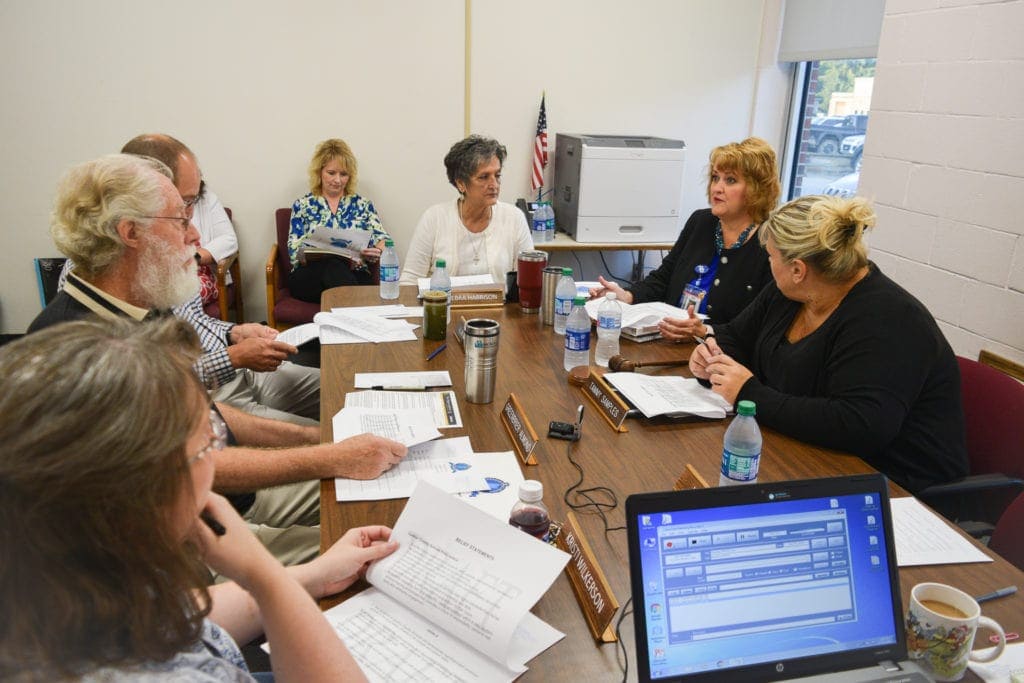BUCKHANNON – Members of the Upshur County Board of Education met in a special session early Tuesday morning at the Fred Eberle Technical Center to discuss the superintendent’s and BOE’s goals, as well as a proposal for a School Building Authority project at Tennerton Elementary School.
BOE members as well as Upshur County Schools Superintendent Dr. Sara Lewis Stankus and Assistant Superintendent Dr. Debra Harrison agreed the main goal was to develop programs and opportunities for their students to assure they have the necessary skills to be college- and/or career-ready following graduation.
“We met with directors several times to go over the goals and looked at our goals from last year,” Stankus said. “This year, what we wanted to do was to continue our work from last year. Our focus will be on the 10-year plan. We will continue looking at student achievement and how to improve it.”
Stankus said school officials are thrilled the levy passed in January 2019. This school year, she said, administrators want to be able to demonstrate significant and continual student growth in the acquisition of skills to be college and career ready.
“Looking at the data collected from our community meetings, our area is looking at accelerating students who are going to college,” Stankus said. “We have been meeting with college presidents to define and sign agreements for our two-year associate degrees so when students graduate from high school, they will also have two years of college under their belt.”
Stankus said they are looking at what the “career-ready” student will need.
“What that means is, we need to be more responsive to business and industry,” she said. “In one of our meetings for the CEFP (Comprehensive Educational Facilities Plan) we talked to the recruiter from the hospital. She said we need more CNA (certified nursing assistant) candidates as well as medical assistants. We don’t have that program right now, but maybe we should develop that. If we know that is an area that is needed, maybe we should add that.”
Fred Eberle Technical Center Director Rebecca Bowers-Call said the CNA program can be completed in one or two years and if they add the medical assistant program, students can complete it in one year.
“If we know the hospital right here in our hometown needs CNAs or MAs, we can develop a program in response to that,” Stankus said. “If we know that, why then, could we not get students who are interested in that? We have a waiting list for that program, don’t we?”
“We should be putting out 38 CNAs this year,” Bowers-Call said.
“There are many other instances of the same sort of career-ready training,” Stankus said. “We are going to have a pilot program in aeronautics, and we are looking at drone technology in that program as well. Right now, we are working on building an advisory board for the aeronautics program. We are really excited about some of these possibilities.”
Stankus said over the summer, Sarah Wamsley attended a training in developing a virtual enterprise.
“So, if you are going to be a welder, you need to know how to run a business,” she said. “This virtual enterprise system will teach those career tech students how to manage and run a business – everything from looking at the books to projecting costs and salaries.”
Stankus said the new innovation center in downtown Buckhannon will have an office to help new start-up businesses.
“So, that seems like a natural place to do some of this that we are working on now,” the superintendent observed.
BOE President Dr. Tammy Samples asked Bowers-Call to do some research on adding a medical assistant course at FETC and find out how much the startup costs would be.
Another proposal Stankus said they are working on is hiring someone to go into the community and find out what is needed, then connect the students with those needs.
“It could be volunteers, it could be internships, it could be externships,” she said. “We need someone to go out into the community and talk to people and find out how many students they need. Right now, we don’t have that person, but we need a liaison to talk to business, industry and nonprofit organizations. Then, we could develop a plan for our students to get engaged with our community. We feel like students can learn so much from those experiences; it is embedded learning, and it is something they will never forget.”
Stankus said not only do the schools need to provide these programs, but said it is vital to connect to business and industry.
“Fairmont State is offering one of five programs in the nation called National Information and Security,” she said. “On the fourth year of this college degree, students go and work at the FBI Center. So, the FBI has designed this program. We want our students to know about that, so if they want to do that, [it’s possible]. Often, our students don’t know about these programs. We have to do a better job of letting our students know about their options. That should start earlier than high school.”
BOE member Alan Suder agreed.
“That is my thought. I still think we need some kind of an after-school program in career readiness,” Suder said. “We are paying for transportation. Why couldn’t we transport them somewhere that they will get some technical education or career readiness two hours a night for six weeks?”
“We could have parent pickup afterward,” he added. “That would allow a child not to be home by themselves while parents are working. I feel like we are missing some of our students in 11th- and 12th-grade for career readiness because they … talk to their friends and decide to go to college, and they drop at their first year. Then, they are back home; whereas, if we had some after-school program it might open their eyes to the fact they could run a piece of heavy equipment or be an electrician. They can still go to college, but at least they would have something to fall back upon.”
Samples said she liked that idea.
Suder said he feels one mistake was the elimination of shop class and home economics, and students are missing the opportunity to build or create something with their hands. He also said every child wants to drive, but they need to have basic skills associated with operating a car, such as changing a tire, changing the oil, etc.
He said it might give kids a spark. Suder suggested students test out college by taking a college-level class, and if they ascertain college isn’t for them, they would still have training or a trade, they could fall back on. In the alternative scenario, if they do want to pursue a college degree, they would possess skills that could help them earn money for college in the summer months.
Stankus said the next two goals are that all students develop the personal skills and dispositions of wellness, responsibility, cultural awareness, self-direction, ethical character and good citizenship in an environment that is caring and safe and fosters effective communication and relationships with and among the community.
“These are foundational skills – good communication, eye contact and being an ethical person – these are things that are the foundation for everything else we do,” Stankus said.
“Many of our students are not getting this anywhere, so it is important to get it at school,” Harrison agreed. “The big thing is accountability and responsibility – if we can teach those, I don’t think there is a more powerful message – if we can instill this in our students, I think everything else will come.”
The fourth goal is to provide financial resources and services in order to support the goals and purpose of Upshur County Schools. Stankus said the schools are intentionally engaged in grant writing.
“Right now, every single school will be working on writing a STEM grant for $7,500 each,” she said. “It’s not a lot, but for things we need, like an iPad, that can be written into a grant. When you multiply that by nine schools, that means something.”
Stankus said last year, Upshur County Schools received $2.2 million without a dime of match money.
She said the last goal refers to the Upshur County School facilities and is to strive to offer modern, efficient facilities conducive to college and career readiness learning, standards and outcomes that respond to workforce and economic demands.
“The facilities goal is a CEFP plan to improve and upgrade infrastructures reflective of future thinking, preparing our students to be job ready including safety and security,” she said.
Upshur County received a federal grant to install cameras in all schools.
“That would have cost us a lot of money, but we wrote a grant,” Stankus said.
Samples suggested making a plan.
“Sometimes we have really good ideas, but there is not enough steam to move ahead,” she said. “I don’t want us to lose the momentum to carry this through.”
BOE members looked at a project for Tennerton Elementary School that would be submitted through the School Building Authority. The project includes improvements for life safety, including a new fire sprinkler system, new intercom and security system as well as a safe school entry. It has an addition of kindergarten and pre-K classrooms, bringing students who are being transported to various locations in the county back to their home school.
The project also includes a school-based health clinic to address growing physical, social and emotional needs of students. Members voted to approve the project with the stipulation they would look at any needed changes. Stankus said the cost of the proposed project will be presented at the regular BOE meeting at Rock Cave Elementary School Tuesday evening.













